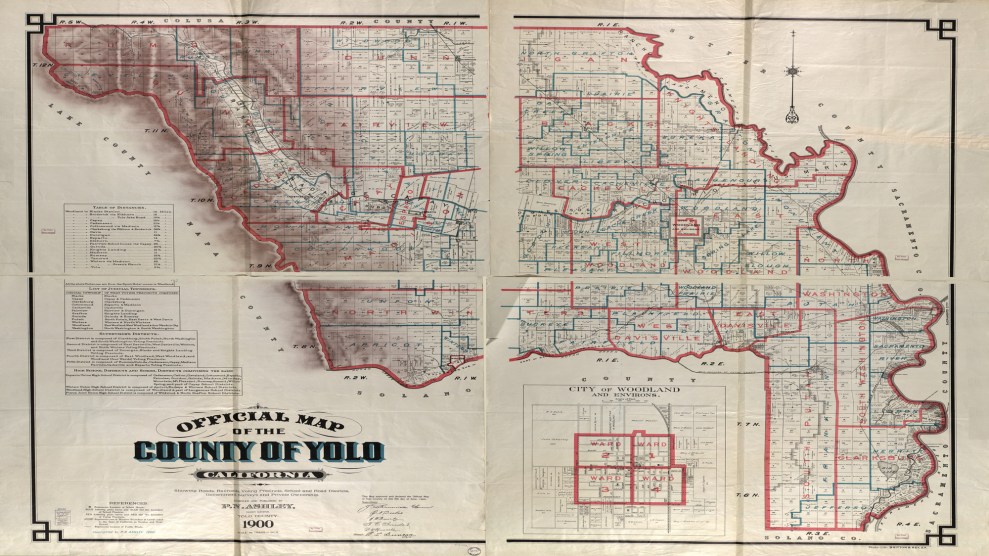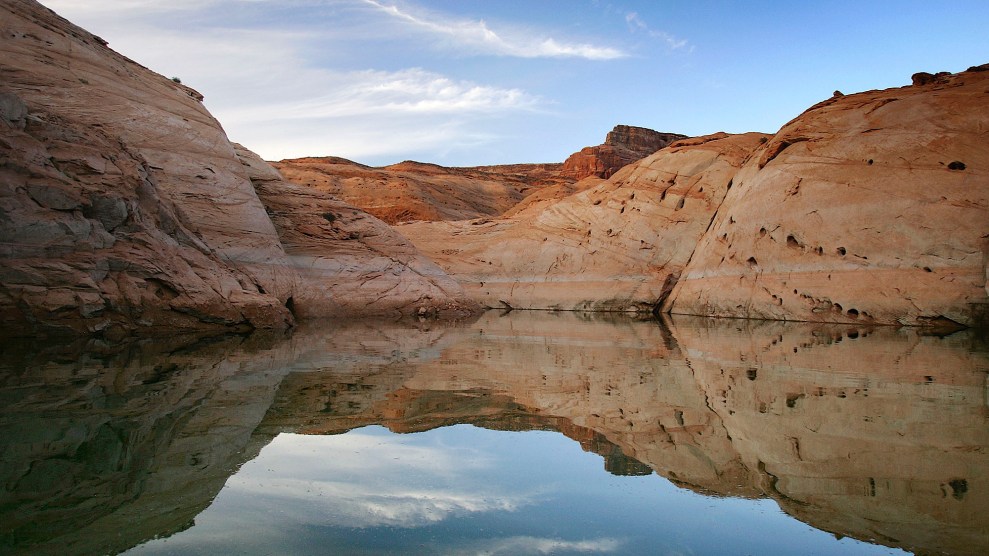
High Country News/Library of Congress
This story was originally published by High Country News and is reproduced here as part of the Climate Desk collaboration.
The Chinese surveillance balloon seen over Montana in January riled up state legislatures and got them asking the question: How much control should foreign countries have over US land and natural resources?
Senate Republicans in Texas answered, “None whatsoever,” advancing a bill that would prohibit Chinese, Russian, and Iranian citizens from owning not just land, but even a home, under the pretext of national security. “This bill may prove even more significant in light of a Chinese spy balloon that traversed across the continental United States,” said Republican state Sen. Lois Kolkorst, the bill’s author.
When bills single out individuals by their nationality, they draw startling parallels to the xenophobic Alien Land laws of the 20th century. They also raise concerns about their own legality and ethics.
Texas is not the only state looking to curtail foreign land ownership in the US, however. Five states across the West—and 24 across the country—have proposed laws that aim to restrict various forms of land, property and natural resource ownership by foreign citizens and companies.
The bills generally focus on “foreign adversaries” like China, even though the data shows that Canadians and Europeans possess far more US property than any other foreigners do. Of the 40 million acres of agricultural land purchased by foreign interests, less than 1 percent is owned by China. Only 73 acres were linked to Russia, according to the US Department of Agriculture. The majority of foreign-owned ag land—62 percent—is controlled by Canadian and European business interests.
Rather than focusing specifically on another nation, I think we should focus on absentee ownership in general,” said professor Loka Ashwood, a rural sociologist at the University of Kentucky. An absentee owner is a person who lives outside of the county or country where the land in question is located. It’s the primary way that land becomes consolidated by corporate agribusiness, said Ashwood. Such businesses—including the Seaboard Corporation, a global food, energy and transportation company, and Border Valley Trading, one of the largest exporters of compressed hay products in the West—aren’t always foreign, Ashwood added.
By emphasizing the “who” (the individual countries) vs the “what” (multilayered business conglomerates), the proposed bills fall short of tackling corporate consolidation of land and natural resources, said Ashwood.
Meanwhile, Chinese initiatives to expand that country’s domestic food and livestock production could undermine the very premise of some of these bills—the idea that they would protect American food security.
California SB 224What it proposes: Restricts all foreign government purchases, leases, and controlling interests of agricultural land.
Background: Gov. Gavin Newsom unexpectedly vetoed a previous version of this bill last year after it received unanimous support across both state chambers. Newsom objected to the bill’s stringent record-keeping requirements for all foreign-owned plots of land, including water rights, a measure Ashwood believes is important for improving transparency and data collection. Newsom believed the record-keeping would be too arduous for the California Department of Farming and Agriculture. State Sen. Melissa Hurtado reintroduced the bill in February, thinking it could clear the final hurdle this go around. Although the proposed law does not identify China by name, no other country conducts as much business with “state-controlled enterprises,” one of the categories outlined in the bill. Roughly 3 percent of California’s agricultural land is foreign-owned. Purchases made before January 2024 would be exempt from the restrictions.
Arizona HB 2376
What it proposes: Restricts sale and lease of state lands to foreign governments, state-controlled enterprises and any company headquartered in China, Russia, or Saudi Arabia. It also prevents countries on the State Department’s list of State Sponsors of Terrorism from holding land.
Background: The bill, co-sponsored by 10 Republican state representatives, has moved swiftly through the Legislature since its introduction in late January. But early versions of it had one omission that raised eyebrows: Saudi Arabia. Last year, Arizona’s government came under scrutiny for its ongoing lease of 3,500 acres of state land to Almarai, a multinational dairy company headquartered in Riyadh. Almarai is using the state’s dwindling groundwater to irrigate thirsty alfalfa, which is exported to feed cows back in the Arab Gulf. A recent amendment added Saudi Arabia to the list.
Washington HB 1412What it proposes: Restricts sales and leases of agricultural land to foreign governments, state-controlled enterprises, foreign entities or foreign-controlled domestic companies.
Background: Washington’s bill is perhaps the most ambitious of the lot. Because it includes foreign-controlled domestic companies—those headquartered in the U.S. but owned by investors abroad—Ashwood thinks it could be the law that comes closest to slowing corporate consolidation of land and plundering of resources. Foreign investors can circumvent some of the laws proposed in other states by acquiring a company headquartered in the US. Washington has the third-highest proportion of foreign-owned land in the country, mostly consisting of industrial timber operations across the state’s vast forests. The Canadian and European firms dominating the sector won’t be banished, but all new purchases would cease beginning in 2024. Crucially, the bill would also prevent the growth of foreign companies buying water rights through land acquisitions.
Utah HB 218 and HB 186
What it proposes: HB 218 would prevent any foreign government or any entity controlled by one from holding real estate, land and resource rights in the state. HB 186 prevents companies linked to the military of a foreign adversary—as defined by the Department of Defense—from holding real estate, land, and resource rights.
Background: Utah is considering two competing laws that differ in scope. House Bill 186 confines its actions to “restricted foreign entities,” a definition meant to zero in on companies linked to China’s military, such as Huawei, that could pose a threat to national security. House Bill 218 is far more sweeping; its sponsor, state Rep. Kay Christofferson, told the Associated Press, “Do we really want any foreign country coming in and buying our agricultural land, our forests or our mineral rights?” As of 2021 the Netherlands owned the largest fraction of Utah’s land, a total of 32,000 acres, according to USDA data. China trails just behind with roughly 30,000 acres, used primarily for alfalfa that is exported to feed dairy cows.
Montana SB 256
What it proposes: Bans past and future land holdings and real estate purchases by foreign governments, entities or citizens from “adversary” nations.
Background: Citizens from countries that the federal government deems “foreign adversaries”—Russia, China, Venezuela and others—would no longer have the right to own a home or any land in the state. From 1923 to 1955, Montana’s Alien Land laws similarly prevented Chinese immigrants from owning land. This bill includes a retroactive component that applies to all property holdings purchased before the bill would go into effect. Unlike some of the Western states listed above, China lacks a significant presence in Montana, a fact that casts doubt on claims that the bill would address food security concerns. SB 256 was presented as a safeguard against Chinese surveillance operations, which could use rural land to eavesdrop on military installations in Montana.
Nevertheless, the law would be a sharp departure from Montana’s bipartisan attempts over the last decade to court Chinese agricultural investment. A Republican state senator closed a beef deal with Chinese e-commerce giant JD.com worth $300 million in 2017. Three years later, Montana was set to entertain a Chinese trade delegation eyeing wheat exports before the trip was scuttled after errant comments by then-President Donald Trump. SB 256 currently sits a breath away from the governor’s desk.
Texas SB 147
What it proposes: Banning sales or acquisitions of property by any government, entity or citizen of China, Russia, Iran or North Korea.
Background: As with the Montana bill, Texas is flirting with reviving key provisions of the racist Alien Land laws that were abolished in the state in 1965. The proposed bill’s initial version would have made it illegal for citizens of the above countries to own any land or homes in Texas. An amended version provides an exception for Chinese citizens with green card visas. Republican Gov. Greg Abbott tweeted his support for the first version and said he would sign the bill if it reaches his desk. Other measures of the bill are a response to the large tracts of foreign-owned farmland in the state. Texas has the largest share of foreign-owned land in the country—5.3 million acres—a fact that drew attention when a Chinese billionaire purchased 140,000 acres of land for a wind farm development in 2016. January’s spy balloon incident excited political passions and aroused support for the law among Texas Republicans.








